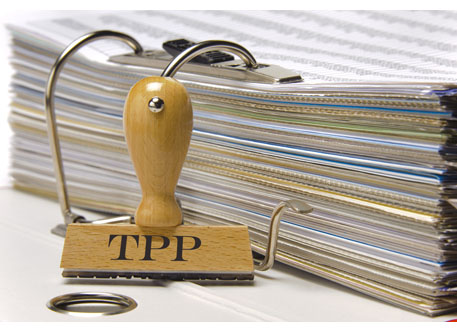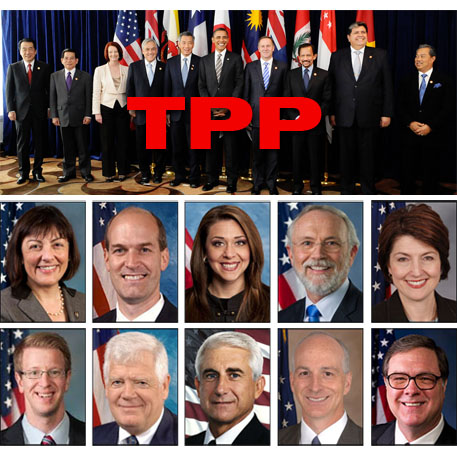OPINION
Let’s reject this TPP, go back to the table, and get it right
(Dec. 18, 2015) — The following guest column was published in today’s edition of The Seattle Times:
By JEFF JOHNSON
The public has finally been permitted to see the biggest so-called free-trade agreement ever negotiated. It should come as no surprise — given the international corporate interests who sat at the bargaining table — that it’s more of the same, just on a grander scale.
 Here in Washington state, we never seem to have a serious debate about whether these free-trade deals are really good for people or the planet. Our state’s elected officials often willfully ignore the clear connections between decades of globalization under these deals, the growing crisis of climate change and an out-of-balance U.S. economy that has decimated the middle class.
Here in Washington state, we never seem to have a serious debate about whether these free-trade deals are really good for people or the planet. Our state’s elected officials often willfully ignore the clear connections between decades of globalization under these deals, the growing crisis of climate change and an out-of-balance U.S. economy that has decimated the middle class.
Instead, the debate gets dumbed down to this: “Washington is a trade-dependent state. This deal will increase trade. We should support it.”
Let’s dig deeper. This is too important. We need to get this right.
The Trans-Pacific Partnership (TPP) isn’t just about trade and tariffs. It would set the rules for about 40 percent of the global economy and grant international corporations and investors extraordinary new rights. In doing so, it poses many political, economic and moral questions that require thoughtful consideration:
● Should a private company be allowed to sue a nation over labor, environmental or public-safety laws that cost the company profits? (The TPP says “yes.”)
● Should there be trade sanctions and enforceable penalties against nations that allow — or even promote — slavery and human trafficking? (TPP says “no.”)
● Should consumer-privacy protections for sensitive personal health and financial information be subject to challenge as unfair restrictions on “data flow?” (TPP says “yes.”)
● Should countries that manipulate the value of their currencies to boost their exports and gain unfair advantage over trading partners face any penalties? (TPP says “no.”)
● Should the United States waive all existing “Buy American” procurement policies — for everything from bridge and highway materials to the cars government employees drive, which ensure U.S. tax dollars are spent creating U.S. jobs? (TPP says “yes.”)
● Should trade rules give some consideration to the global threat of climate change? (TPP says “no.”)
That last question is a biggie. The World Trade Organization acknowledges that “trade intersects with climate change in a multitude of ways.” And President Obama says, “Someday, our children, and our children’s children, will look at us in the eye and they’ll ask us, did we do all that we could when we had the chance to deal with this problem and leave them a cleaner, safe, more stable world?”
The TPP is an extraordinary once-in-a-lifetime opportunity to negotiate the rules of global commerce, but it totally ignores this crisis. Climate change is not even mentioned in the TPP, much less addressed in the bold, creative ways the crisis demands. Will we look our children, and our children’s children, in the eye and tell them we passed on this opportunity because it was just too hard?
These are all important questions about what America stands for, about our values as a nation and about what kind of world we want to live in. That’s why this debate needs to be about so much more than the “trade is good” pat-on-the-head we get here in Washington.
 Globalization could and should be a powerful force for good. The rules we set could protect basic human rights, improve everyone’s living standards, and promote economic and environmental sustainability among all the participating nations.
Globalization could and should be a powerful force for good. The rules we set could protect basic human rights, improve everyone’s living standards, and promote economic and environmental sustainability among all the participating nations.
Soon Congress will decide. Because lawmakers approved fast-track trade negotiation authority, Congress cannot vote to improve these deals, it can only approve or reject them.
Congress should reject TPP. That’s not a vote against trade or against globalization. That’s not a vote against the positive aspects of TPP.
Rejecting TPP would be recognition that this is too important to rush through despite TPP’s clear shortcomings. It would be recognition that the people of this country want more than just the same old free-trade promises — that the benefits would eventually trickle down. It would be recognition that TPP is a rare opportunity to affect positive change not just for profits, but also for people and the planet.
Reject this version of the TPP. Go back to the bargaining table and get it right.
 Jeff Johnson is President of the Washington State Labor Council, AFL-CIO, the largest labor organization in the Evergreen State, representing the interests of more than 500 local unions and 400,000 rank-and-file union members.
Jeff Johnson is President of the Washington State Labor Council, AFL-CIO, the largest labor organization in the Evergreen State, representing the interests of more than 500 local unions and 400,000 rank-and-file union members.





